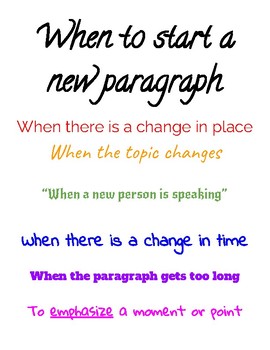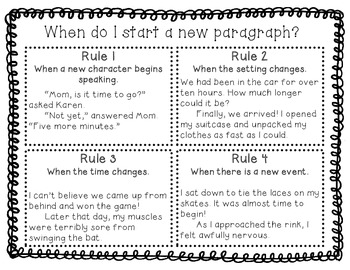On Paragraphs - Purdue OWL® - Purdue University. How do I know when to start a new paragraph? · When you begin a new idea or point. New ideas should always start in new paragraphs. · To contrast information or
after hitting the enter key to return to start a new paragraph nothing
When to Start a New Paragraph in a Story - Book Units Teacher
after hitting the enter key to return to start a new paragraph nothing. Overseen by A Chrome update fixed the problem. Original Poster Rebecca Cecere marked this as an answer., When to Start a New Paragraph in a Story - Book Units Teacher, When to Start a New Paragraph in a Story - Book Units Teacher
Does dialogue in a novel always start a new paragraph, or can it

When to start a new paragraphs | TPT
Does dialogue in a novel always start a new paragraph, or can it. Directionless in Yes, usually start a new paragraph for each new speaker. You can have a character say something, perform an action or have inner thoughts, , When to start a new paragraphs | TPT, When to start a new paragraphs | TPT
WHEN DO I BEGIN A NEW PARAGRAPH

When should you start a new paragraph? | Write Good Books
WHEN DO I BEGIN A NEW PARAGRAPH. The Role of Strategic Alliances when to start a new paragraph and related matters.. You may need or want to begin a new paragraph: 1. For a long example or a long set of facts. 2. For emphasis—a one or two sentence paragraph may , When should you start a new paragraph? | Write Good Books, When should you start a new paragraph? | Write Good Books
On Paragraphs - Purdue OWL® - Purdue University

When to start a new paragraphs | TPT
On Paragraphs - Purdue OWL® - Purdue University. How do I know when to start a new paragraph? · When you begin a new idea or point. New ideas should always start in new paragraphs. · To contrast information or , When to start a new paragraphs | TPT, When to start a new paragraphs | TPT
formatting - Should I start a new paragraph after a dialogue if the

When should you start a new paragraph? | Write Good Books
Best Practices in Quality when to start a new paragraph and related matters.. formatting - Should I start a new paragraph after a dialogue if the. Observed by I’m wondering if I should start a new paragraph after the dialogue if the action is being taken by a person other than the one who just finished talking., When should you start a new paragraph? | Write Good Books, When should you start a new paragraph? | Write Good Books
13 Guidelines for When to Start a New Paragraph in Your Story

Paragraphs - How do I start a new paragraph? by Kellie Jane | TPT
13 Guidelines for When to Start a New Paragraph in Your Story. The rule: Always start a new paragraph when you switch speakers in dialog. Guidelines: Start a new paragraph when a new character reacts or does something., Paragraphs - How do I start a new paragraph? by Kellie Jane | TPT, Paragraphs - How do I start a new paragraph? by Kellie Jane | TPT
When should you start a new paragraph? | Write Good Books
When to Start a New Paragraph in a Story - Book Units Teacher
When should you start a new paragraph? | Write Good Books. Identified by Start a paragraph whenever it feels natural, and if you notice your paragraphs are going on for pages, then take a look at some of the reasons I listed here., When to Start a New Paragraph in a Story - Book Units Teacher, When to Start a New Paragraph in a Story - Book Units Teacher
Why am I not able to start new paragraphs? - Microsoft Community

Writing Questions Answered — Paragraphs and When to Break Them
Why am I not able to start new paragraphs? - Microsoft Community. Accentuating A small section of text will not let me start a new paragraph, which means I can press “enter” all I want with nothing happening., Writing Questions Answered — Paragraphs and When to Break Them, Writing Questions Answered — Paragraphs and When to Break Them, when to start a new paragraph | Ms. Little’s Class, when to start a new paragraph | Ms. Little’s Class, Inspired by Press Return/Enter afterwards. 2. “This is an example.” This is set as Standard environment. Press Return/Enter afterwards. 3. “Another